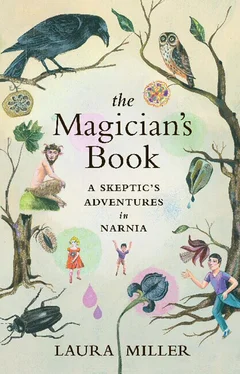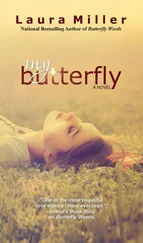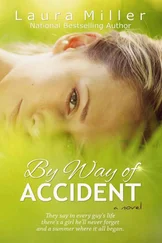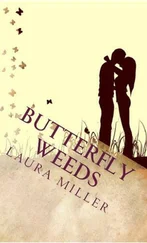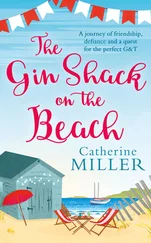The Magician's Book : A Skeptic's Adventures in Narnia
by
Laura Miller
For Wilanne Belden
On the next page she came to a spell “for the refreshment of the spirit.” The pictures were fewer here but very beautiful. And what Lucy found herself reading was more like a story than a spell. It went on for three pages and before she had read to the bottom of the page she had forgotten that she was reading at all. She was living in the story as if it were real, and all the pictures were real too. When she had got to the third page and come to the end, she said, “That is the loveliest story I’ve ever read or ever shall read in my whole life. Oh, I wish I could have gone on reading it for ten years. At least I’ll read it over again.”
But here part of the magic of the Book came into play. You couldn’t turn back. The right-hand pages, the ones ahead, could be turned; the left-hand pages could not.
“Oh, what a shame!” said Lucy. “I do so want to read it again. Well, at least I must remember it. Let’s see … it was about … about … oh dear, it’s all fading away again. And even this last page is going blank. This is a very queer book. How can I have forgotten? It was about a cup and a sword and a tree and a green hill. I know that much. But I can’t remember and what shall I do?”
And she never could remember; and ever since that day what Lucy means by a good story is a story which reminds her of the forgotten story in the Magician’s Book.
— C. S. Lewis,
The Voyage of the Dawn Treader
In one of the most vivid memories from my childhood, nothing happens. On a clear, sunny day, I’m standing near a curb in the quiet suburban California neighborhood where my family lives, and I’m wishing, with every bit of my self, for two things. First, I want a place I’ve read about in a book to really exist, and second, I want to be able to go there. I want this so much I’m pretty sure the misery of not getting it will kill me. For the rest of my life, I will never want anything quite so much again.
The place I longed to visit was Narnia, the setting for a series of children’s novels by C. S. Lewis. There are things about these books that I, at age nine, did not yet understand and did not even realize were there to be understood. My relationship to Narnia would turn out to be as rocky as any love affair, a story of enchantment, betrayal, estrangement, and reunion. A few years after the day I’m remembering, when I discovered some of the more obvious “secret” meanings in C. S. Lewis’s children’s books, I felt tricked, and for a long time I avoided even thinking about Narnia.
Eventually, warily, after I became someone who reads books and writes about them for a living, I decided to revisit the Chronicles of Narnia. I was thinking about origins. I’d been given an assignment: describe the single book that had most influenced me, that had changed my life. I could have written about Jane Eyre, the first “grown up” novel with which I fiercely identified as a teenager, or Dante’s Divine Comedy, the first literary monument that was made to breathe and bleed and yield up its splendor to me by a gifted professor. That’s the sort of title most writers would choose when presented with this question. If you’ve ever read one of those articles that asks notable people to list their favorite books, you may have been impressed or daunted to see them pick Proust or Thomas Mann or James Joyce. You might even feel sheepish about the fact that you reread Pride and Prejudice or The Lord of the Rings or The Catcher in the Rye or Gone With the Wind every couple of years with so much pleasure. Perhaps, like me, you’re even a little suspicious of their claims, because we all know that the books we’ve loved best are seldom the ones we esteem the most highly — or the ones we’d most like other people to think we read over and over again.
I vowed to be scrupulously honest about this assignment, and that meant acknowledging that the most momentous passage in my reading life came when I was in second grade. A teacher I idolized handed me a copy — her copy — of The Lion, the Witch and the Wardrobe. It was this book that made a reader out of me. It showed me how I could tumble through a hole in the world I knew and into another, better one, a world fresher, more brightly colored, more exhilarating, more fully felt than my own. This revelation really did make a new person out of me. I reread The Lion, the Witch and the Wardrobe and its six sequels countless times. I became one of those children who haunt libraries, checking out the maximum number of titles every week, scouring the shelves for signs that this one or that one would spirit me away to a place almost as marvelous as Narnia. I was notorious at school for sneaking a library book into my lap during class and becoming so mesmerized by it that I wouldn’t hear the teacher when she called my name. I read through recess and lunch hours, deaf and blind to whatever was going on around me.
This aspect of my story isn’t unusual, although I did have the good fortune to find a way to make a living writing about books. Still, being a literary critic isn’t really very much like being a ten-year-old girl, dead to the world in the corner of a playground as she turns the pages of The Dark Is Rising. A critic has to write as well as read, and while the process of writing about a book can reveal things you’d never get from simply reading it, it can also make reading a less immediate and visceral experience. I began the long task of learning how to read in this new way not long after I first discovered Narnia.
A lot of people remember the bliss of their earliest reading with a pang; their current encounters with books offer no more than faint echoes of what they once felt. I’ve heard friends and strangers talk about the days when they, too, would submerge themselves in a story, surfacing only to eat and deal with the minimal daily business of childhood. They wonder why they don’t get as much out of books now. If you dig deep to the roots of what makes someone a reader, you’ll usually find the desire to recapture that old spell. But as we get older we acquire another set of reasons for picking up a book: because reading is “good for you,” for example, or because it was assigned by a teacher. People read to fend off the boredom of long flights, to find out what kinds of books get published nowadays, to stay abreast of what’s new, to catch up on what they should have learned in school, to hold their own at a cocktail party, to be able to say they’ve read Moby Dick .
No wonder we pine for the days when we read only for ourselves. Many years after I first opened The Lion, the Witch and the Wardrobe, I learned that C. S. Lewis, too, was a literary critic, and that he, too, was interested in readerly pleasure. He had the eccentric notion that the delight people take in a book might give us some clue as to its worth. In a slender volume entitled An Experiment in Criticism, one of the best books about reading I have ever found, Lewis suggested that the literary preferences of children are significant because “children are indifferent to literary fashions. What we see in them is not a specifically childish taste, but simply a normal and perennial human taste, temporarily atrophied in their elders by a fashion.”
But the schism between childhood and adult reading can’t be entirely written off to vanity and trendiness. Although I miss the childhood experience of being engulfed by a story, I would not willingly surrender my adult ability to recognize when a writer is taking me someplace I don’t want to go. In my early teens, I discovered what is instantly obvious to any adult reader: that the Chronicles of Narnia are filled with Christian symbolism and that The Lion, the Witch and the Wardrobe offers a parallel account of the Passion of Christ. I’d been raised as a Catholic, but what faith I’d had was never based on anything more than the fact that children tend to believe whatever adults tell them. As soon as I acquired any independence of thought, I drifted away from the Church and what I saw as its endless proscriptions and requirements, its guilt-mongering and tedious rituals.
Читать дальше
